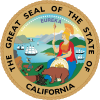AB-32
| Global Warming Solutions Act of 2006 | |
|---|---|
 |
|
| California State Legislature | |
| Full name | Global Warming Solutions Act of 2006 |
| Status | Passed |
| Introduced | April 3, 2006 |
| Assembly voted | August 31, 2006 |
| Senate voted | August 30, 2006 |
| Signed into law | September 27, 2006 |
| Sponsor(s) | Fabian Nunez and Fran Pavley |
| Governor | Arnold Schwarzenegger |
| Code | Health and Safety Code |
| Section | 38500, 38501, 28510, 38530, etc. |
| Resolution | AB32 (2005-2006 Session) |
| Associated bills | AB 398 (2017-2018 session; extends cap-and-trade until 2030), SB 32 (2015-2016 session; adds GHG reduction target of 40% below 1990 levels by 2030) |
| Website | www |
The Global Warming Solutions Act of 2006, or Assembly Bill (AB) 32, is a California State Law that fights global warming by establishing a comprehensive program to reduce greenhouse gas emissions from all sources throughout the state. AB 32 was authored by then-Assembly member Fran Pavley and Assembly Speaker Fabian Nunez (D-Los Angeles) and signed into law by Governor Arnold Schwarzenegger on September 27, 2006.
On June 1, 2005, Governor Schwarzenegger signed an executive order known as Executive Order S-3-05 which established greenhouse gas emissions targets for the state. The executive order required the state to reduce its greenhouse gas emissions levels to 2000 levels by 2010, to 1990 levels by 2020, and to a level 80% below 1990 levels by 2050. However, to implement this measure, the California Air Resources Board (CARB) needed authority from the legislature. The California State Legislature passed the Global Warming Solutions Act to address this issue and gave the CARB authority to implement the program.
AB 32 requires the California Air Resources Board (CARB or ARB) to develop regulations and market mechanisms to reduce California's greenhouse gas emissions to 1990 levels by the year of 2020, representing approximately a 30% reduction statewide, with mandatory caps beginning in 2012 for significant emissions sources. The bill also allows the Governor to suspend the emissions caps for up to a year in case of emergency or significant economic harm.
The State of California leads the nation in energy efficiency standards and plays a lead role in environmental protection, but is also the 12th largest emitter of carbon worldwide. Greenhouse gas emissions are defined in the bill to include all of the following: carbon dioxide, methane, nitrous oxide, sulfur hexafluoride, hydrofluorocarbons and perfluorocarbons. These are the same greenhouse gases listed in Annex A of the .
...
Wikipedia
